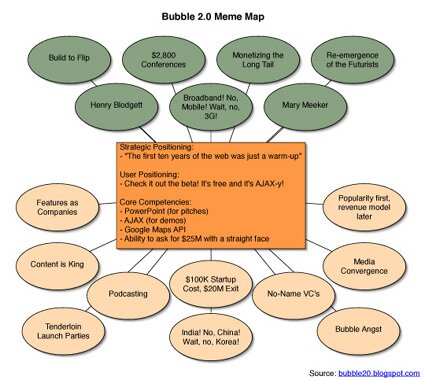Web version 2, Electric Boogaloo
November 7th, 2005, By Duncan Gough
There’s plenty of buzz around Web 2.0 at the moment. There’s also an increasing amount of backlash.
Personally, I take issue with the fact that Web 2.0 is defined by a set of interchangeable identifiers, like tags, social software, agile development and AJAX. This is the fundamental paradox. Web 2.0 suggests Web 1.0 exists, yet it cannot definitively prove the difference between a Web 1.0 application and a Web 2.0 one. Slashdot, for example, cannot exist if we accept the Web 2.0 paradigm since it is a socially focussed platform for news and discussion that existed before Web 2.0. It has had user moderation and meta moderation for some time now. If all Slashdot needs are tags and a bunch of AJAX to become Web 2.0, then clearly we need to rethink out definitions.
I’ll gladly accept that these objections are trivial, though. I’m aware of the fact that I’m enforcing a strict 1.0/2.0 regime where there isn’t one. Web 2.0 is the banner under which a new phase of the web can begin. Whilst I’ll probably enjoy the fruits of any buzz that Web 2.0 brings, I am, however, particularly frustrated at the amount of attention being given to what is just a marketing term. Frustrated because the people who deserve the attention, those who have worked hard to bring the web back from the last dot-com, the developers, are being ignored.
It wasn’t the developers who forgot that the web is fundamentally a social medium, but it was a developer who brought tagging to the masses. Again, the first marketing-driven dot-com bubble refused to acknowledge the concerns of many developers over the direction, design and viability of the web at that time, creating paradigm-busting nonsense like ‘push’ technology, overly complex ’solutions’ like SOAP and, yes, a multitude of poorly implemented web designs. There were plenty of other mistakes made too. I’ve seen, on a number of occassions first-hand, the problems that poor management and stupid egos created during the first dot-com boom. So how did the developers respond? Polling RSS combined with proper conditional-GET headers. RESTful URLS, CSS and valid, semantic markup. I know which I prefer.
Of those innovations, the idea of REST is key. The web is a social medium built on the HTTP, protocol. HTTP is a very well thought out standard and one which will power Web 2.0 just as it powered Web 1.0. Clearly, a lot of people see the web as an opportunity to make their mark but a lot of the new ideas that account for Web 2.0 have already been implemented with far less hype. Because the basic building blocks of the web, HTTP, allows it.
Thankfully, open source developers in particular, will have grasped this concept a long time ago - there were a lot of decisions taken in the early stages of computing that were the right ones. That still apply today. For example, anyone who has a shell account on a linux machine will know that power of piping the output of one command into another. Many simple, portable unix commands are designed to work in a bigger whole. The restraint shown in their design is appreciated by open-source developers. The lack of over-engineering is reflected again and again in their code.
If Web 2.0 is here, I don’t mean to attack it. Web 2.0 needs Data 2.0 and Data 2.0 needs MetaData 2.0. A lot of people are becoming more and more defensive about the onset of the term Web 2.0 because they are scared about the possible results. Looking at the precedent, things are not very encouraging. Having spent so long recovering from the dot-com bust, having rescued HTTP and REST from the ashes, it’s not surprising that there are a number of people, like myself, who are feeling slightly protective. REST, after all, has beaten off SOAP and has now inspired more innovation in the shape of microformats.
In truth, Web 2.0 is still a long way off. We need to take more advantage of REST and HTTP before we can move on to the two way web. We need better browsers, better markup and better ideas. For the time being, let’s just try not to lose sight of the building blocks. The web is a platform, and thanks to HTTP, it has been all along.
Oh, someone tell me that AJAX is just a fad. It breaks every kind of REST and UI rule I can think of.
One comment
-
Web 2.0 » Blog Archives » Advance Wars By Web 2.1 replied:
[...] A weblog about casual games development by Duncan Gough working in London There s plenty of buzz around Web 2.0 at the moment. There s also an increasing amount of Continue [...]
March 8th, 2007 at 12:16 pm. Permalink.

